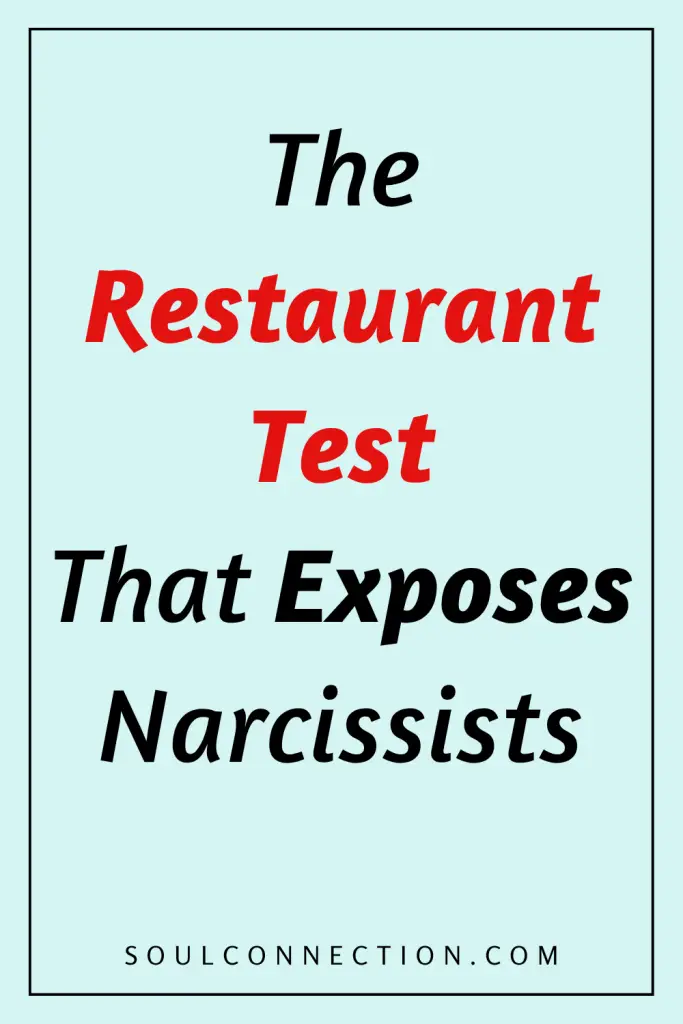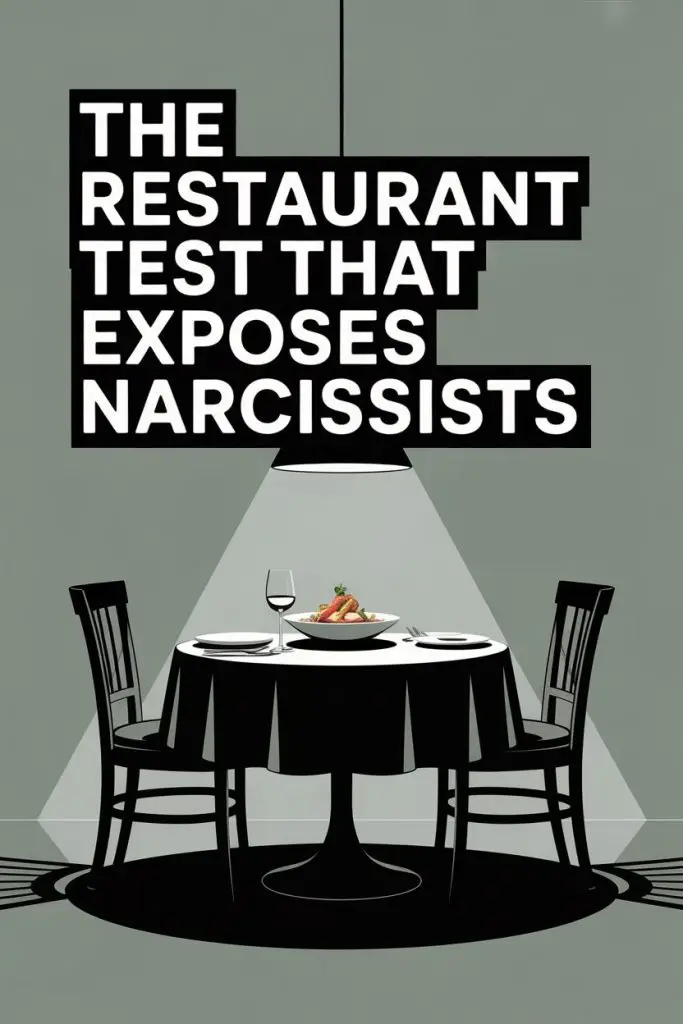Ever wonder if your date’s charming smile is hiding something sinister? The answer could be sitting right across the table—next to the breadbasket.
Welcome to the restaurant test, an age-old litmus for sniffing out narcissistic tendencies, no Rorschach inkblots required.
Why Restaurants Reveal What Therapy Sometimes Misses
No other everyday setting can strip down social niceties quite like a restaurant. The waiter brings a side of psychology with every entree. Menus become battlegrounds for control, complaints, and compassion—or lack thereof.
How does your companion treat the staff? How do they respond to mistakes? Who gets the last chip?
It’s not about being a food critic; it’s about noticing which appetites truly drive your dinner date.
Watching Interactions with the Staff
If you’re wondering where narcissism quietly steps out from the shadows, look at how someone treats the people serving them.
Narcissists often see waiters, baristas, and hosts as extras in their personal production.
Barking orders, snapping fingers, referring to staff as though they’re invisible—these are classic acts in the narcissist’s dinner theatre.
If your date acts as though decency is something you only extend to those who can help you, it’s a red flag with a side of fries.
Noticing the opposite? Someone who’s polite and genuinely grateful? That’s worth raising a toast.
The Entitlement Entrée
Narcissists have a sixth sense for feeling slighted: “Why is their food out before mine?” “That’s not how I wanted it cooked.”
The sense of entitlement can transform a simple meal into a courtroom drama, starring your date as the Plaintiff of Perpetual Injustice.
Sure, everyone gets hangry now and again. But a narcissist will turn a minor inconvenience into a full-blown spectacle, demanding managers, discounts, or apologies.
Suddenly, the room temperature is a personal attack, the saltshaker a symbol of disrespect. You’re not just having dinner—you’re starring in a one-act play called “The World Owes Me Everything.”
The Need to Impress
Watch how your companion handles the menu. Are they ordering the priciest bottle of wine, loudly explaining the difference between Malbec and Merlot, and humblebragging about that one time in France?
Narcissists love shining—especially when there’s an audience.
If your date’s biggest pleasure comes from showing off or regaling you with stories about their “regular” spot at some Michelin-starred wonderland, ask yourself: Who are they actually trying to feed—their ego, or their appetite?
Conversation Starters and Stoppers
Dining out should be a two-way street of conversation, with a side of laughter or the occasional awkward joke. Narcissists, though, turn every chat into a monologue.
Suddenly, you’re trapped in an endless TED Talk about their accomplishments, their ex’s inadequacies, their dazzling career.
When you squeeze in a story, do they listen—or just wait for their next turn to speak? The restaurant test is a microphone for empathy (or the lack thereof).
If you leave dinner knowing everything about them, and they struggle to remember your last name, the results are in.
Handling Mistakes and Mishaps
Restaurants aren’t Swiss watches. The wrong appetizer appears, the steak’s a bit too pink, a waiter drops a glass—it happens. The way your date responds can be ultra-revealing.
Empathy shines when someone treats errors as, well, human. Narcissists, on the other hand, will see every slip as a personal slight.
Instead of laughing it off or quietly asking for a fix, they’ll fume, pout, or launch into a speech about “standards.”
If your lovely evening becomes a dramatic crusade for the perfect meal, consider this your warning sign.
The Money Moment
Ah, the bill arrives. Nothing lets you glimpse a person’s values quite like the simple act of splitting—or not splitting—dinner.
Does your date insist you pay, even after ordering the most expensive thing on the menu? Do they make a big show about picking up the tab as a way to assert dominance? Or, better yet, do they “forget” their wallet for the third time?
Narcissists often use money as a power play. Generosity is only on display if there’s an audience or an expectation of something in return.
If you feel like you’re being manipulated through finances, take note.
Listening for Subtle Put-Downs
The meal isn’t just about calories—it’s an opportunity for a narcissist to peck away at your confidence.
Did they poke fun at your order? Roll their eyes at your choice of dessert? Make jokes about your tastes in a way that stings?
These subtle digs may seem harmless at first, but they’re often seeds of control and superiority.
A healthy dinner date celebrates differences. A narcissist needs to be right, even about salad dressing.
Your Feelings When You Leave
Sometimes, the best test happens after you’ve left the table. Are you energized and happy, or deflated and second-guessing your stories, your outfit, your worth?
Narcissists have a knack for making you feel like you’re lucky to have shared a meal with them, rather than the other way around.
Take stock of your mood. If you feel unheard, small, or as though you’ve just survived a two-hour audition, the restaurant test has spoken.
Putting the Restaurant Test to Use
Before you start quizzing every date on their tipping habits or their views on arugula, remember: one night isn’t always the whole story
. Bad days happen. Nerves get the best of us. But patterns tell the real tale.
If you spot two or three of these warning signs in one meal? That’s no coincidence.
Taking it a step further, you might make a mental checklist for future outings—watching how your partner treats not just you, but everyone in their orbit. A narcissist’s spotlight rarely dims, even when the date is over.
Beyond Dinner: Why These Habits Matter
Wondering if all this food for thought is just social etiquette? Far from it. How someone treats others in everyday moments is a window into how they’ll treat you once the “honeymoon phase” ends.
Dinner dates might feel trivial, but they’re a sneak preview of partnership. Compassion—or the absence of it—shows up when the kitchen’s backed up, the bill’s wrong, or the table wobbles.
Spotting these signs early can spare you months, or even years, of drama. Plus, it makes for one heck of a story at brunch.
Next Steps: What If You Spot a Narcissist?
Let’s say your date fails the restaurant test with flying colors. Should you run for the hills? Maybe. Should you give them a second chance? That’s up to you.
The most important thing is to trust your gut. If your meal left you feeling uneasy, dismissed, or like a supporting actor in someone else’s show, you’re not obligated to stick around for act two.
Boundaries are your best friend—and a fabulous dessert to boot.
If you’re still giving benefit of the doubt, try a different setting: coffee with a group, a walk in the park, a low-key meal at home. Patterns repeat themselves.
You don’t need to be Sherlock Holmes to spot a narcissist—just a bit more observant at dinner.
Table for One, Please
Scoring a narcissist on the restaurant test isn’t about proving you’re perfect. We all have off-nights and embarrassing moments (hello, spinach in teeth).
But if someone reveals a repeated pattern of entitlement, cruelty, or disregard for others, you’re not being picky—you’re being wise.
Next time you’re out, pay attention to more than the menu. The real meal is the company you keep—and your instincts are the best maître d’ in town.
Bon appétit, and may your dining companions always pass the test.


